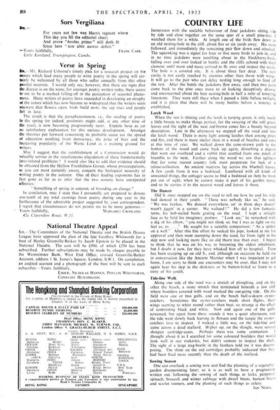Verse in Spring
et,—Mr. Richard Usborne's timely plea for a research project on the muses which lead many people to write poetry in the spring will cer- tainly be welcomed by all those who suffer annually from this often painful neurosis. I would only say, however, that there are signs that the disease is on the wane, for amongst poetry written today there seems to me to be a marked falling-off in the perception of seasonal pheno- mena. Many writers of poetry have succeeded in developing an atrophy cif the senses which has now become so widespread that the writers seem unaware that flowers open. birds build nests, the sap rises and people fill in love.
The result is that the paraphenomenon, i.e.. the reading of poetry io the spring (or indeed, pessimists might add, at any other time of the year), is now becoming progressively rarer. Experts have as yet no satisfactory explanation for this curious development. Amongst the theories put forward concerning its probable cause are the spread of education resulting from democracy, the price of beer and the Increasing popularity of the Waste Land as a training ground for writers.
May I suggest that the establishment of a Commission would do valuable service in the simultaneous elucidation of these fundamentally inter-related problems ? 1 would also like to add that evidence should be obtained from the Mellow Fruitfulness Group, whose preoccupations, as you are most certainly aware, concern the biological necessity of writing poetry in the autumn. One of.their leading exponents has in fact gone as far as to infer that the two seasons have unexpected affinities:
" Something of spring in autumn, of brooding on change."
In conclusion, may I state that I personally am prepared to donate one-tenth of my total earnings from poetry during one year to the furtherance of the admirable project suggested by your correspondent. I regret that circumstances do not permit me to be more generous.—


































 Previous page
Previous page